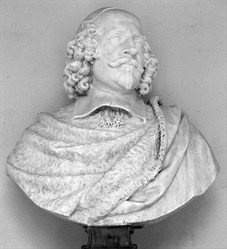Giulio Mazzarino
 Giulio Mazzarino (1602-1661) was born in Pescina, in the region of Abruzzo. He grew up, however, in Rome, studying at the prestigious Jesuit Collegio Romano, although he never entered the Order. After graduating in utroque iure, he participated in the War of Succession of Mantua and Monferrato (1628-1631) first as a fighter and then, in a much more decisive way, as a diplomat to arrive at the signing of the Treaty of Cherasco. This success opened the doors for him to the French court, where he enjoyed the esteem of Louis XIII and especially his minister-favourite, Cardinal Richelieu. At the latter’s death, Mazzarino, who in the meantime had been created cardinal by Pope Urban VIII in 1641, carried on the latter’s legacy, leading France in a very delicate moment in history. Louis XIII died in 1643, his successor Louis XIV was only five years, while the monarchy was committed to a leading role in the final phase of the Thirty Years’ War. Together with the Queen Mother Anne of Austria, with whom Mazzarino maintained a hidden relationship for years, Mazarino had also faced the revolt of a large part of the highest nobility of the kingdom, known as the Fronde (1648-1653), mainly directed against extraordinary measures imposed by the war and the government of the favourites. If in domestic policy he could strengthen the power of the king and prepare the way for the monarchy of Louis XIV, in foreign policy Mazzarino won the final victory over the Spanish rivals with the signing of the Peace of the Pyrenees (1659), which was further strengthened by the marriage between the King of France and Maria Theresa of Austria, daughter of Philip IV of Spain. He died at the height of his political success, on 9 March 1661.
Giulio Mazzarino (1602-1661) was born in Pescina, in the region of Abruzzo. He grew up, however, in Rome, studying at the prestigious Jesuit Collegio Romano, although he never entered the Order. After graduating in utroque iure, he participated in the War of Succession of Mantua and Monferrato (1628-1631) first as a fighter and then, in a much more decisive way, as a diplomat to arrive at the signing of the Treaty of Cherasco. This success opened the doors for him to the French court, where he enjoyed the esteem of Louis XIII and especially his minister-favourite, Cardinal Richelieu. At the latter’s death, Mazzarino, who in the meantime had been created cardinal by Pope Urban VIII in 1641, carried on the latter’s legacy, leading France in a very delicate moment in history. Louis XIII died in 1643, his successor Louis XIV was only five years, while the monarchy was committed to a leading role in the final phase of the Thirty Years’ War. Together with the Queen Mother Anne of Austria, with whom Mazzarino maintained a hidden relationship for years, Mazarino had also faced the revolt of a large part of the highest nobility of the kingdom, known as the Fronde (1648-1653), mainly directed against extraordinary measures imposed by the war and the government of the favourites. If in domestic policy he could strengthen the power of the king and prepare the way for the monarchy of Louis XIV, in foreign policy Mazzarino won the final victory over the Spanish rivals with the signing of the Peace of the Pyrenees (1659), which was further strengthened by the marriage between the King of France and Maria Theresa of Austria, daughter of Philip IV of Spain. He died at the height of his political success, on 9 March 1661.
Read more:
- R. Bonney, Political change in France under Richelieu and Mazarin 1624-61, Oxford 1978.
- G. Treasure, Richelieu and Mazarin, London-New York 1998.
- D. J. Sturdy, Richelieu and Mazarin: a study in statesmanship, Basingstoke 2004
